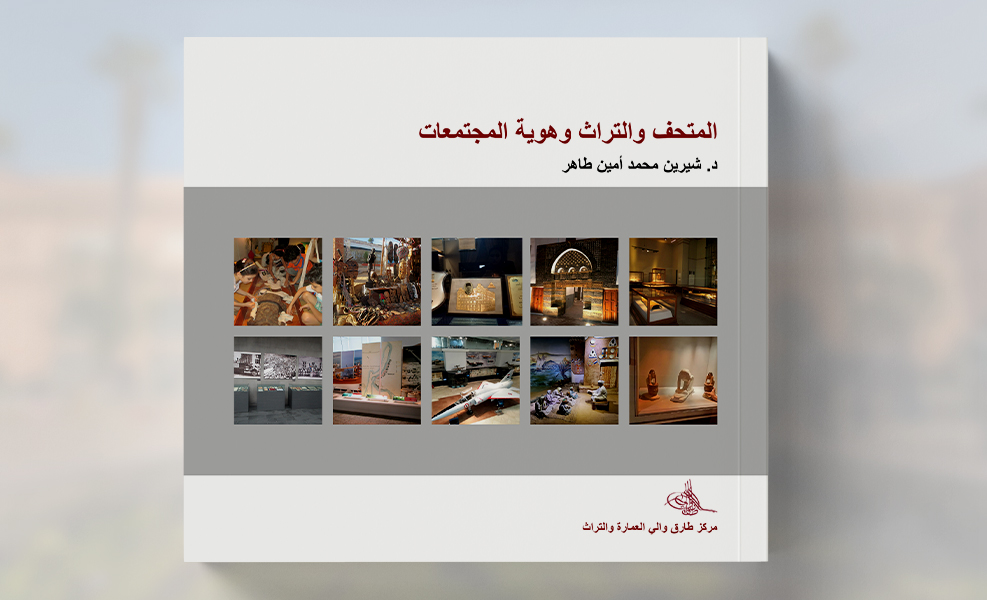‘Museum, Heritage and Social Identity’ book written by Shreen Amin (ITP 2016)
Written by Dr Shreen Amin, Curator, Museologist and Heritage Professional, Egyptian Museum, Cairo (ITP 2016)
Dear Colleagues,
I am writing to share with you some exciting news. My first book in Arabic has been published, by Tarek Waly Center Architecture & Heritage. Digital Object Identifier (DOI): https://doi.org/10.47288/TWC.DB.002.2023 Available in a digital copy via the Open Access Publications Initiative https://walycenter.org/en/museum-heritage-and-social-identity

My book highlights how museums are among the most influential actors influencing societies and reducing the history of nations and peoples in their various aspects, expressing human heritage with vivid experiences that reflect the past and shape the present and future. These museums are cultural and educational institutions that provide numerous benefits and services to the surrounding communities, and they are regarded as the mirror of cultures and their living witnesses. Museums house the heritage of nations and peoples, as well as the beliefs and values of society.
From this perspective, the book presents a series of topics that define the importance of museums and highlight the relationship between museums and heritage, as well as their role in influencing societies. It also discusses the museum’s cultural and educational role by shedding light on the relationship between museums, societies, and heritage, as well as methods of evaluating educational programs in museums and mechanisms for analyzing community needs, both of which are challenges for educational program providers.
One of the critical topics is the importance of marketing cultural institutions effectively to allow museums to fulfill their cultural and educational roles while attracting the greatest number of people. Furthermore, the museum’s relationship with cultural tourism is a strong relationship that is linked in some ways to the museum’s educational tasks, and for the museum to achieve its desired goal, the element of sustainability must be present. As a result, the books presents the dimensions of cultural heritage sustainable development to emphasize their significance. The book then proposes a quality measurement guide for Egyptian museums as the significance of developing an evaluation criterion for Egyptian museums lies in providing a clear methodology for the rules that must be followed in this regard, which are related to realizing the relationship between the museum, heritage, and society. The book also included a tour of the Egyptian Museum to serve as a model for Egyptian students
Great thanks goes to Prof. Dr Darek Welley, the General Director of the Tarek Waly Center Architecture & Heritage, and my dear friend Shiymaa Shahen, the Director of the Centre, for accepting my first book in the Center’s publication
To find out more information about the Centre follow the link here: https://walycenter.org/en/ It is one of the important heritage centers in Egypt, its mission to highlight cultural continuity is an inevitable necessity for architectural and urban practices. It is an assumed responsibility of the predecessors to bequeath to future generations. As well, it is an undertaking to address and hold a dialogue with the community. In the context of space, it addresses the interaction between man and his environment. Temporarily the interaction takes place between the modern, the old and the ancient, and between incidental happenings and expectations. These combinations present the motivation for the Tarek Waly Center Architecture & Heritage to communicate and spread their vision. To read more of the books they’ve published, check the link here: https://walycenter.org/en/archives-9
Tarek Waly Center had established its library to become an informative database for the hypothetical activities of the center’s members and other researchers interested in evolving the Arabic mind. Tarek Waly Center Library includes a diverse collection of references in different fields of knowledge. The library includes collections of around 5000 books in different fields, in addition to the collections of specialized magazines, scientific papers and academic research. Additionally, it includes private collections of rare books, cartography, photography, photo-slides and commemorative postage stamps. The library also includes a digital archive containing more than 10,000 digital copies of books, photographs, maps and other materials.
Warmest Wishes,
Shreen
